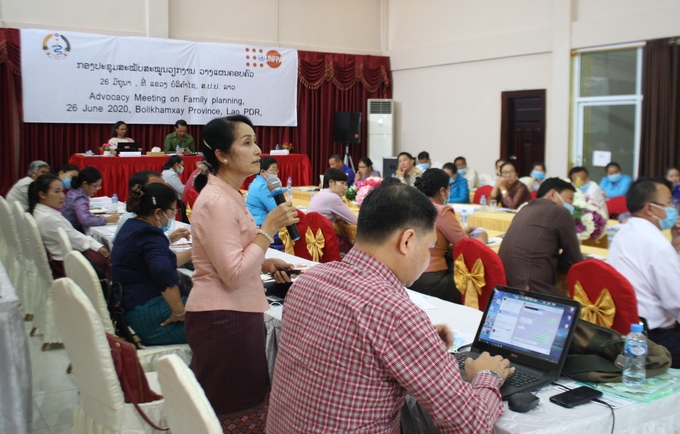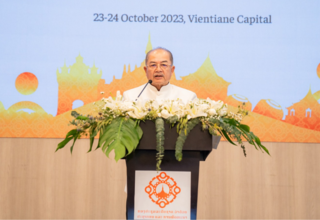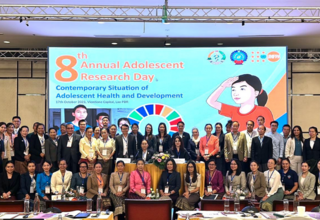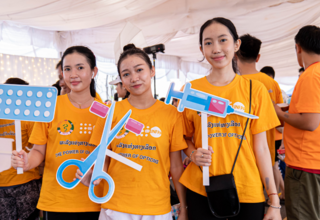Vientiane, Lao PDR, 3 July 2020- In Bolikhamxay and Champasak provinces respectively, Department of Hygiene and Health Promotion, Ministry of Health with UNFPA, convened from Health, Education, Lao Youth Union, Lao Women’s Union, and the Lao Front for Construction on June 26 and 30 to re-energise the national family planning programme. Participants from the six central provinces attended the meeting in Bolikhamxay. While in Champasak, another 50 participants from the Southern provinces joined.
Amongst the first events convened post lockdown, the workshops highlighted government commitment to Sexual Reproductive Health and Rights and to Family Planning as a key health programme providing a high return on investment (USD 7 saved for every USD1 spent) while directly contributing to the reduction of maternal mortality and poverty reduction.
Dr. Phonepaseuth Ounaphom, Deputy Director of Department of Hygiene and Health Promotion, Ministry of Health, stated that the government aims to ensure family planning for everyone, not only for couples but for all people regardless of their sex, social or economic status. He stressed that the government will continue to highlight the importance of family planning in the 9th National Social and Economic Development Plan (NSEDP). To fulfill the renewed commitments on ICPD25, relevant sectors at all levels must ensure family planning information and services reach the most vulnerable. He noted that in Lao PDR, about 15 per cent of married women would like to plan childbearing but are not able to use contraception. Unmet need is highest amongst young women, women with no education, and the poorest. With 75 per cent of girls aged 15-19 having no access to family planning, the adolescent birth rate in Laos remains the highest in ASEAN, with 1 in 10 girls aged 15-19 already beginning childbearing.
Ms. Mariam A. Khan, UNFPA Representative to Lao PDR, stressed that universal access to family planning leads to the reduction of school dropouts, breaking the cycle of poverty, tackles malnourishment, and avoids teenage pregnancy. Committing UNFPA’s continued support to family planning in Laos, Ms. Khan noted that COVID-19 has caused disruption in family planning services. According to Ministry of Health and UNFPA projections, an additional 40,000 -60,000 additional births could be expected in Laos and the 284 maternal deaths per year, might increase to 546 or 684 deaths in the worst-case scenario!
Participants discussed challenges based on mid-term review and stock out reports to determine remedial actions and multi-sectoral cooperation at the local levels. Recognizing the acute needs to reduce the adolescent birth rate, participants agreed to advocate preventing school dropouts and engaging men and boys in the family planning conversation.
UNFPA is also partnering with the Ministry of Education and Sports to include in curricula Phed Suk Sa (comprehensive sexuality education). Well informed youth, aware of their sexual health and choices are better prepared to make safe behavioral choices. Lao Women’s Union and Lao Youth Union representatives pledged to build the capacity of local staff to provide correct messages on family planning and reproductive health to community members, establish peer education, expand the coverage and encourage counselling via the hotlines numbers expanded due to COVID-19. The national commitments from Lao PDR for ICPD25 included ensuring rights and choices for all even during crises. The commitment to family planning focuses on reducing unmet need for family planning, including among adolescent girls, by 2030.
To assist the government, UNFPA will step up efforts in expanding partnerships for innovative solutions.
For more information please contact:
Ms. Siriphone Sally SAKULKU, SRH Programme Coordinator in UNFPA Lao PDR
Email: ssakulku@unfpa.org
************
UNFPA, the UN's sexual and reproductive health agency, works in over 150 countries including Lao PDR, to achieve zero maternal deaths, zero unmet need for family planning and zero gender-based violence and harmful practices towards women and girls.




